How can you successfully start bluewater cruising? If you’re going to spend time, money, and emotional energy getting a boat and heading out to sea wouldn’t it be great to get an edge by learning some dos and don’ts?
Becoming a bluewater cruising sailor is incredible. You’ll enjoy warm temperatures, look out at sandy beaches, tall palm trees, and the deep blue sea. You’ll make many new friends, eat amazingly delicious meals, and have magical experiences often. Your social life will be fulfilling and fun. Life will flow. And you’ll get to travel around the world seeing new lands.
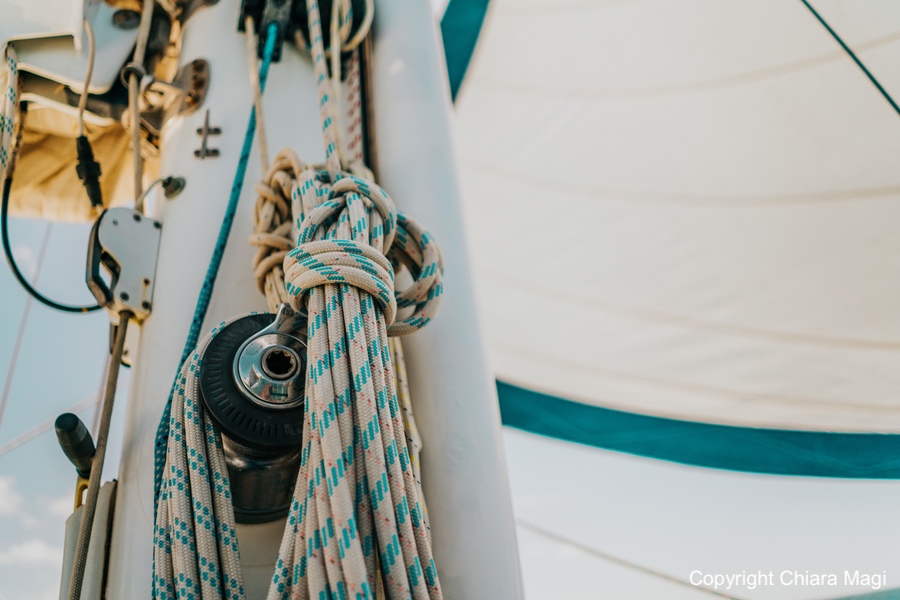
Gain invaluable experience about blue water cruising before you spend time and money. Join us on Britican. Click for more information.
I honestly couldn’t imagine doing anything else other than living and cruising around on, in my eyes, the best blue water sailboat, Britican (I’m biased)! Yes, the cruising life can be out-of-this-world. It can also be very difficult. In fact, it can be so difficult that some people/families don’t make it through the transition.
What exactly is a bluewater cruising?
Blue water cruising is spending long durations full-time on a boat. A cruiser may live in a marina for a hurricane or winter season and when those seasons are over, they’ll spend time sailing from one destination to the next. A bluewater cruiser could spend summers in the NE coast of America and winters in the Bahamas or they could be circumnavigating the world.
Let’s get to the 14 dos and don’ts to bluewater cruising? Read on…
14 Do’s and Don’ts Bluewater Cruising
1. Do set effective and efficient priorities
Put as much of a priority on getting the right boat, or making your boat perfect, as you do making time to get out sailing.
We see newcomers spending months and even years getting the boat ready for the grand adventure yet failing to actually go out sailing. Especially when we’re in marinas, we meet couple after couple that spends time, energy, and heaps of money fitting out their boat.
In most cases, these couples end up leaving the marina only to return after the first voyage or first planned trip.
What happens is that people new to bluewater cruising plan their first trip to be a long one. They then end up in ‘bad’ weather, or something ‘major’ breaks and one or more of the crew (especially if kids are onboard) get scared. Without gaining experience in smaller steps and building upon those experiences, the newcomers try to be seasoned bluewater cruisers from day one.
Imagine someone that wants to run a marathon. Envision that they buy the clothes, get their nutritional regime set up, chooses the right marathon to enter, have a training schedule and then fail to go out running every day. How will they do when race day arrives?!
If you buy a boat and don’t take it sailing, at least weekly for several months, you’re not building up your knowledge and experience to handle longer passages. Furthermore, you’re not testing the boat to see what’s working and what’s not.
Some of the major priorities of becoming a blue water cruisers are as follows:
- Getting the best bluewater sailboat (to be explained later) and knowing used sailboats to avoid
- Making sure the boat is seaworthy and all safety systems are in place
- Going out sailing for even an hour or a few hours throughout the week, every week, until finally going further afield
2. Don’t expect instant success
Most new blue water cruisers are aged 45+ on up. By the time we’re older we like to think we’re good at things. When we do a job, we do it to the best of our ability, and are usually satisfied with our results.
When transitioning to be a bluewater cruiser there’s a hefty learning curve. If you know something about sailing, are good with your hands, or have a background in boat systems the transition is easier but it’s not easy.
You’ll mess up. You’ll hit something or run aground. Things will break and you will not know how to fix them. You’ll get ripped off by a boatyard. What’s important to remember is that you’ll have a series of small failures but they will lead to amazing successes. You do, however, have to allow yourself to fail in the first place.
Being on a boat will humble you. Be prepared to be humbled and you’ll find success. Refuse to be wrong or let your ego get in the way and you’re going to seriously struggle.
| THE BRITICAN EXPERIENCE - A LIFE CHANGING WEEK-LONG LIVEABOARD EXPERIENCE | |
|---|---|
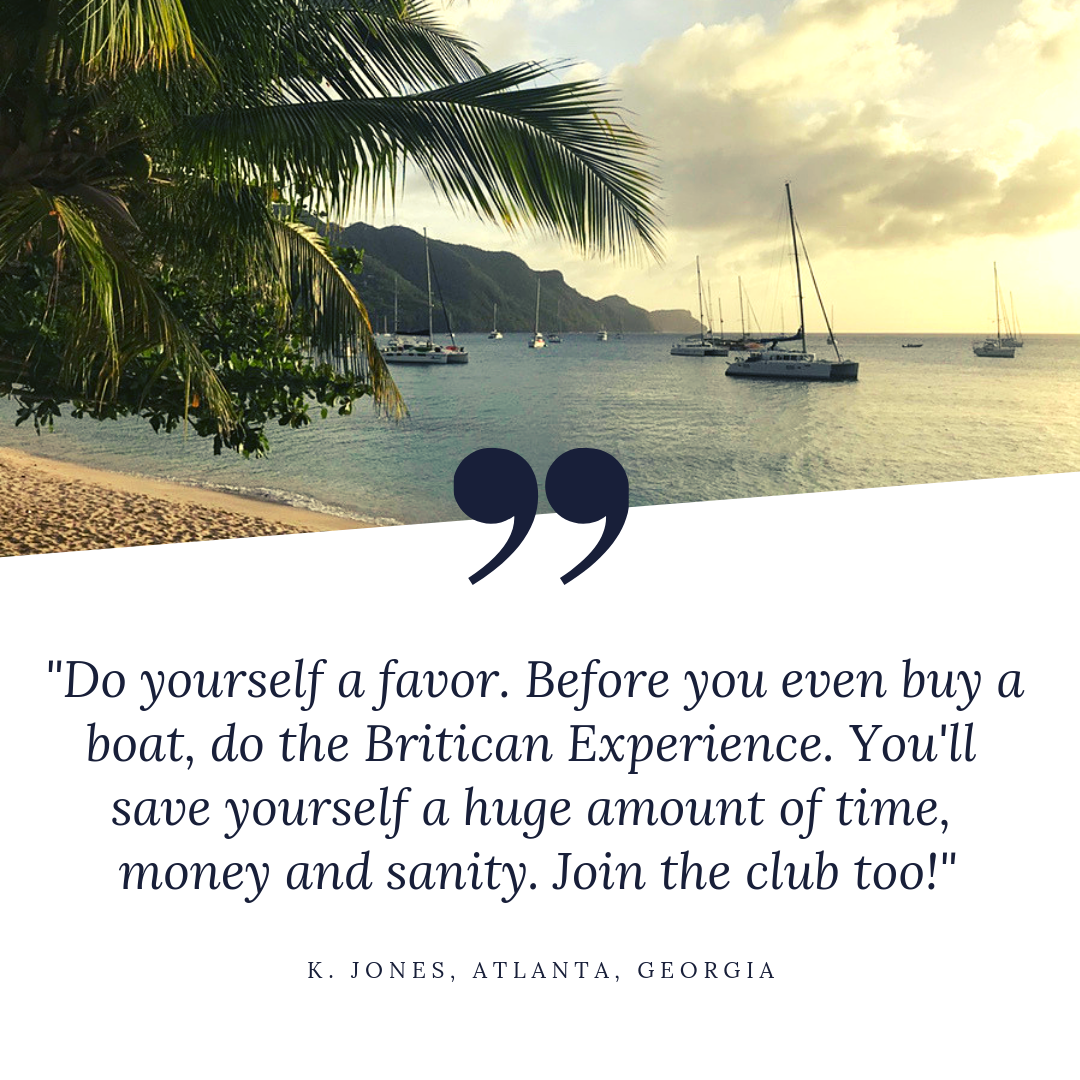 | Join us on Britican for a week-long liveaboard sailing experience. Each experience is created bespoke to you/your partners/your families needs. Learn how to sail at night, plan passages, and/or book into foreign countries AND enjoy the sun, sand and sea of the tropics. We teach singles, couples and families what it truly is like to live the liveaboard lifestyle. Let us help you to make your dreams come true! Click here for more information. And find out about our Members Only Club too. |
3. Do look at the best bluewater sailboats
Many new blue water cruisers buy the wrong boat for their cruising intentions or simply buy a lemon.
Some boats are made for sailing in the oceans and others are not. Some are more practical for the Bahamas and others are better for the Southern Ocean. Many are good for kids and some are really not safe at all. The list goes on and on.
At the time of writing this article a lovely guy, named Tom, from Toronto came up to me while anchored in Antigua.
Tom explained that he took his 39’ Beneteau (a good size boat for Lake Ontario) down from the States to the Caribbean (small boat for bluewater cruising). He said it’s the very worst boat you could ever be in on an Ocean. He’s been in, what felt like a washing machine, the whole way. Beneteau’s are light displacement boats. Unlike heavy displacement boats they get tossed around and the journey is possible but can be quite uncomfortable.
And Tom then stated, ‘Also, I do like my wife, but we each sleep in separate rooms because there’s just not enough space.’
The good news about Tom, however, is that he now knows what to DO.
Tom managed to sell his Beneteau and is heading back to Toronto to sell his house and buy the right boat (for his bluewater cruising plans and necessary comfort requirements). He’s been bitten by the blue water cruising bug and now knows a heck of a lot more now than he did before.
Fortunate for him, he dipped his toes in the water before selling everything. He bought a ‘small’ boat and got out on the ocean to gain some experience and an insight into the lifestyle. Tom gained invaluable experience and now knows it’s the right lifestyle but he’s not got to find the right boat for his cruising intentions. Tom is now looking for a heavy displacement boat with more room to enjoy sleeping next to his wife 😉
And what about new and used sailboats to avoid?
Some boats are flat out junk. They’ll never actually sail without something breaking or falling apart or off. Do you remember the movie ‘The Money Pit,’ where Tom Hanks and Shelly Long buy a house and it just falls apart? Well, that’s what having the right boat is like. YES – even when you have the right boat, it’s constantly falling apart. If you get the wrong boat you simply don’t have a chance.
When buying a boat there are definite ways to increase your likelihood for a good boat.
Reduce your chances a bad blue water sailboat!
If using a broker, it’s important to find one that is not representing the seller of the boat. So, instead of calling up the broker on Yacht World and initiating a possible purchase, you first find a broker that comes highly recommended (from a source independent of the boat).
Once you find a quality broker, you ask the broker to find what you’re looking for. And then the broker will call up the broker on Yacht World and work on your behalf to ensure the process works for your benefit (and not detriment).
After working with the broker to create a strategy on what you want, why you want it, in addition to discussing timings and budget, you can start to narrow down your options (with the help of your broker). Eventually, you’ll find the boat that has the highest potential to be the ‘right’ boat.
After asking the key questions to weed out duds, it’s time to move forward in the process.
Make sure to get my guide, Sailboat Buying Guide For Cruisers, to know what to ask prior to a personal viewing. Within the guide, there is also a checklist on what to look at when viewing boats to buy. Get this guide – it will help you know what red flags to look out for when viewing a boat.
If all looks good there are two fundamental things to do:
Get a professional survey from a surveyor that does not know the broker, seller, marina and comes recommended by boat owners that have used him/her. And make sure there is a sea trial. You must see the boat working in the water.
Never, ever, ever buy a boat that has been on the hard where the owner is reluctant to put in the water to show that it works.
Chances are the boat doesn’t work or worse, the boat doesn’t even float. It’s imperative to find out if the engine works, the sails go up/out and the bluewater boat stays afloat.
It’s also massively advantageous that you have specialists look at the large cost centers – the hull, engine(s), rigging and sails. Surveyors are not necessarily experts in all these areas. They might be great at spotting osmosis on the hull but terrible at determining if the engine is in a good state or not.
Many surveyors will not go up the rig and hence you’ll have no idea if the rigging, a high expense item, needs to change.
When we buy our next boat we’ll have an independent broker representing and working on our behalf. We’ll then have a recommended surveyor AND we’ll bring in a mechanic to fully investigate the engines. We’ll also have a rigger inspect the rig.
There are probably more lemons out there than you’d expect. During this part of the process, avoid failure when becoming bluewater cruiser! It’s vital to do your homework and make sure you have experts to support you.
4. Don’t prioritize storage is being a huge importance
This is the scenario we hear often. Hubby says ‘I really want to go sailing.’ His wife replies, ‘Sure thing as long as I have loads of space to put things.’ The couple then goes to buy a boat that’s too big and load it down with too much stuff. Especially on Catamarans, the boat gets slower and slower the heavier the load.
After a few months, the couple then offload their stuff a ‘treasures of the bilge sales’.
My suggestion – start with the minimum amount of everything.
You only need a week’s worth of clothes, a couple of pots and pans, and a Kindle (not real books). You certainly don’t need anything of value – jewelry, keepsakes and so forth.
If you’re planning on selling your house, see if you can borrow someone’s garage for a few months. Put all your stuff, that you think you need to keep, in the garage. I guarantee that when you return to look at your stuff you’ll think, ‘why did I keep any of this?’ And then you’ll finally offload everything.
I’ve never met bluewater cruising newcomers that have told me that they packed the boat with too little… It’s always way too much.
And getting a boat that’s too big can be a blue water cruiser breaker. We’ve met many that couldn’t handle the boat or were too scared to take it out because they actually needed more crew. Bigger is not necessarily better.
When looking at the best bluewater sailboats they need to be a boat that you and your partner/family can handle.
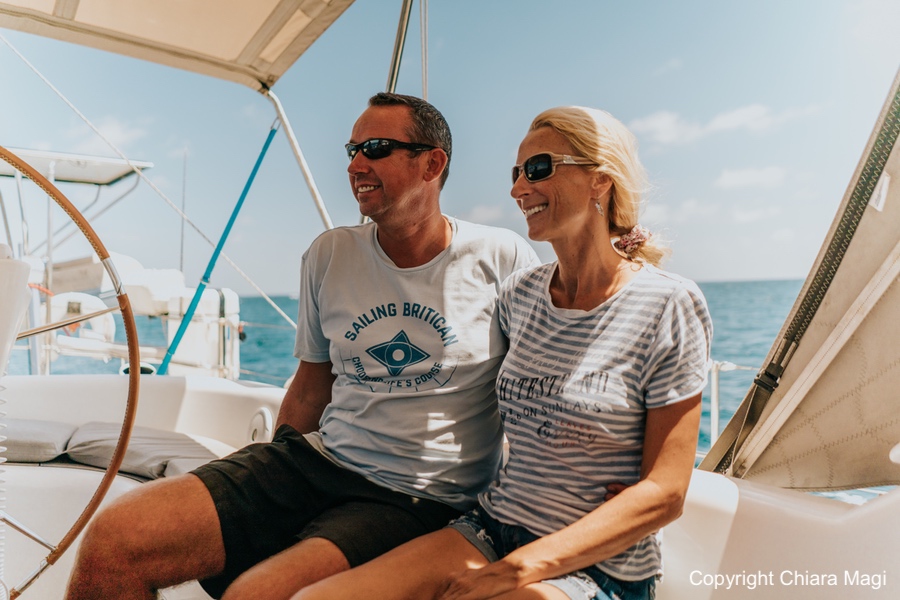
Join us on Britican and find out how to make the blue water cruising lifestyle work as a couple and a family.
5. Do get commitment
It’s not uncommon with new bluewater cruising couples to have one partner not fully committed to the project.
If you want to get out sailing but your partner is reluctant, I suggest you slowly get your partner into the boating life by doing a sailing charter. Show your partner the amazing lifestyle and highlight the massive benefits of being a liveaboard. Once your partner can see the incredible upside, then it’s time to get them interested in wanting to learn how to sail, take care of the boat, and so forth.
Dragging your partner and/or family into the lifestyle without full support and assistance won’t work very well.
6. Don’t do too much too quickly
If you and whoever you’re planning on sailing with has experience on the boat you have, that’s great. And if you’ve done long passages in the areas you plan on going, that’s great too. If however, your sailing experience is on lakes and you are heading out into the ocean, it’s not a good idea to plan a long first voyage.
The Atlantic can be downright freaking nasty.
I can’t tell you how many people go out on it once and vow never to return. Instead of planning a trip from Fort Lauderdale to the Bahamas (crossing the sometimes very turbulent Gulf Stream) it’s better to take the boat out for a few miles, practice anchoring, start to understand the weather/sea state and build up experience.
I know we all want instant gratification but when you take a new-to-you boat out into the big ocean you’ll quickly realize that you’re not only in a harsh and volatile environment, but you’re all alone. You don’t want to be halfway to the Bahamas and have something major break when you’re starting out.
You want to be close to land so you can call someone to tow you in!
Take the boat out over and over and over in an area close to home, land or a tow service way before a longer passage.

Learn more about sailing AND the blue water cruising lifestyle. Join us on Britican. Click the image for more info.
7. Don’t think the grass is greener as a bluewater cruiser
This whole ‘living the dream,’ thing is quite a con. Once you start living the dream, life normalizes and life becomes very similar to the life you were living before you started living-the-dream. If you’re setting sail because you want more freedom, a closer connection to nature, the thrill of adventure, to find a community with similar values, or to just get away from the rat race you’ll gain all those things.
You’ll also gain boat problems.
And dealing with hurricanes, having to overcome seasickness, health issues in foreign substandard areas, feeling homesick/missing friends and family, being stuck somewhere for weeks and even months waiting for parts, getting fatigued by hot weather, mosquito bites, family mutiny and more.
8. Do get knowledge and bluewater cruising experience
You need both education and experience to make the bluewater cruiser lifestyle work. Many people focus on getting sailing skills but you actually sail very little in comparison to being at anchor, on a mooring, or in a marina.
Of course, you need to know how to sail, the rules of the road, passage planning, weather forecasting, and provision preparation but that’s just the tip of the iceberg. Furthermore, there’s the stuff they teach you to get qualifications and then there is the way that everyone actually does it. For example, no one uses charts and dividers anymore. Apps take care of everything all on one screen.
While stationary, there are systems to maintain.
Systems like the engine(s), water maker, refrigeration, plumbing and pumps, cleaning, deck and deck fittings/rig and on and on.
The best way to get education and experience is to get the best bluewater sailboat boat you can and take it out as much as possible – every day, every week, every weekend. By doing so you’ll learn what education you need and every trip, even a small trip, will provide you with an excellent learning experience.
Or consider joining us or another blue water cruising boat to gain education and experience from those that are living the life you’re transitioning into. See below.
| THE BRITICAN EXPERIENCE - A LIFE CHANGING WEEK-LONG LIVEABOARD EXPERIENCE | |
|---|---|
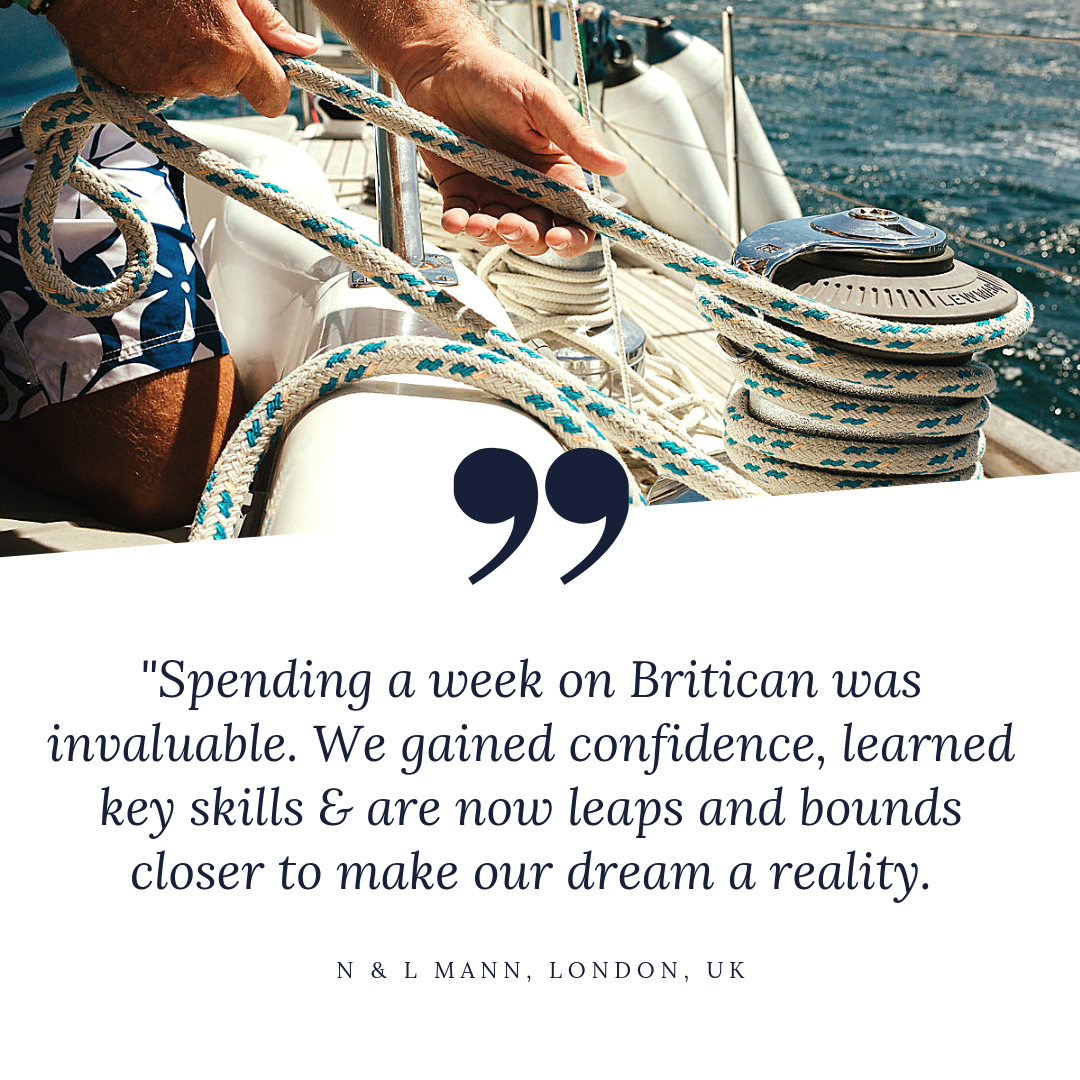 | Join us on Britican for a week-long liveaboard sailing experience. Each experience is created bespoke to you/your partners/your families needs. Learn how to sail at night, plan passages, and/or book into foreign countries AND enjoy the sun, sand and sea of the tropics. We teach singles, couples and families what it truly is like to live the liveaboard lifestyle. Let us help you to make your dreams come true! Click here for more information. |
9. Do prepare to for a transitional period
Many of the people we meet on the sea are ex-business owners, pilots, engineers, doctors, lawyers and a whole slew of other professions. Going from a high-powered-I-am-someone position to a newcomer blue water boat owner is not always easy.
The key with this is to know that there’s a transition to be made.
Many cruisers start a blog, offer consultancy (in their line of work) or figure out extra hobbies to take up while sailing. Some start to do woodworking, learn an instrument, join all the liveaboard social groups – playing dominos, cards, going golfing, etc.
Sure, sailing and maintaining the boat take up a lot of time but there is a lack of mental work or a creative outlet.
If you’re going from high-power to the slower pace of a liveaboard life consider how you’ll make that transition easier. And give yourself time to acclimate.
10. Do appreciate the process of transition (don’t give up too soon)
Some people decide they can’t hack the lifestyle within a few months. Gosh, it takes a long time to truly get into the groove. When we first started out a seasoned sailor told me that it took her and her husband three years to really get everything nailed down pat. I thought, ‘three years!’ I hate to admit it, but she was right. That doesn’t mean that the first three years were bad…they were amazingly awesome and incredibly difficult – now, after many more years of living this life we’re more balanced.
My husband knows what he’s going to cover and I know my roles.
They say that it takes someone three years to really feel at home after moving house to another city/state. On a boat, you’re not only moving house but you truly are moving to a different lifestyle. There is a transition that has to happen there. The good news is that there are loads of people out there that have done it and are doing it.
Online you’ll find loads of cruiser groups to support you through the transition.
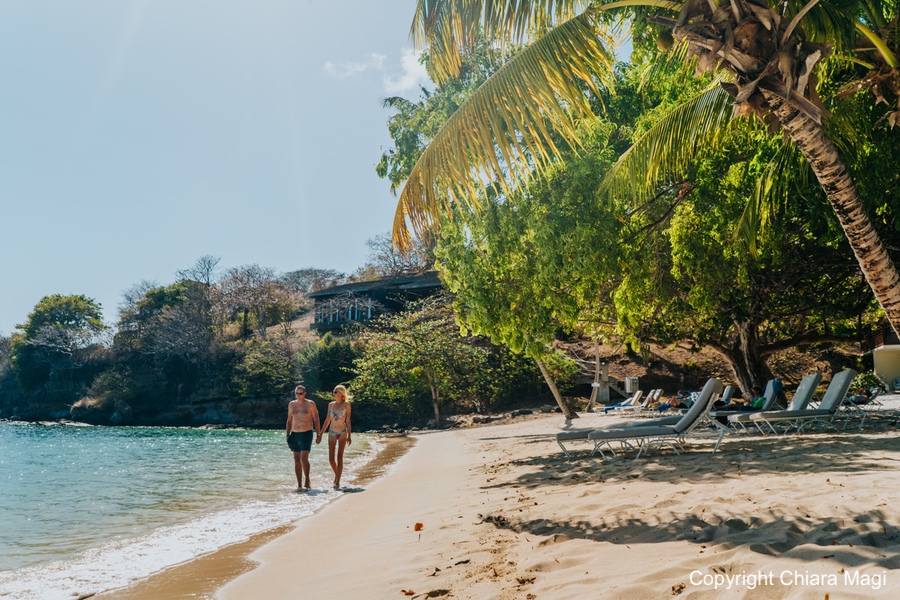
Enjoy the Caribbean beaches AND learn how to be a blue water cruiser. Click here for more information.
11. Don’t have unrealistic expectations
Some people seem to think bluewater cruising life is an escape. They just see the good side of things – the sun, sandy beaches, lobster dinners, inexpensive anchorages. Not yet have I met anyone who’s told me, ‘wow – this whole bluewater lifestyle is way easier than ‘normal’ life.’ In fact, most people say, ‘I knew it was going to be hard but didn’t realize it was going to be this hard.’
I equate it to having a baby.
I kept telling everyone that I fully understood the responsibility of having a child yet when I had our daughter I thought, ‘Holy crap, I totally underestimated how hard this is!’ Interestingly, having Sienna was one of the best things I ever did. Similarly, moving onto our boat has been immensely rewarding. Perhaps there’s something to be said about us all wanting to be happy. Maybe it’s not happiness we really need?
What should you expect as a new bluewater cruiser?
Expect to move to a world where things take forever to happen, everything costs 5x to 10x what you think it should, your home is constantly breaking, dissolving, or wearing away, AND at times it can be a bit scary (storms, hurricanes, taking on water, etc.). You should also expect amazing connections with new friends, views to make your eye’s smile wide, and a sense of freedom and peace that simply doesn’t come easily back on land.
12. Do work on developing a healthy routine
When you move aboard your blue water cruising boat and get out sailing it’s very easy to go into vacation mode and spend way too much money, drink far too many rum punches, and become unbalanced. Exercising is not easy on a boat and although you’re often surrounded by land it’s not as easy as you think to find places to walk/run/exercise.
Everyone says they’ll swim every day but that just never seems to happen.
Before you get on your boat, have a think about what habits will help you to be healthy. Write them down, post them on the wall and just make sure that every day you do what you need to maintain some sort of balance. Whether you need to meditate, take an hour to listen to music, eat certain foods, or have a laughing session by looking at silly YouTube videos…make sure you fit these things into your routine.
If you don’t, you’ll be forever fixing something on the boat.
If you don’t put the rocks in place in your life, you get filled up with sand and there’s no place for the rocks to go.
| THE BRITICAN EXPERIENCE - A LIFE CHANGING WEEK-LONG LIVEABOARD EXPERIENCE | |
|---|---|
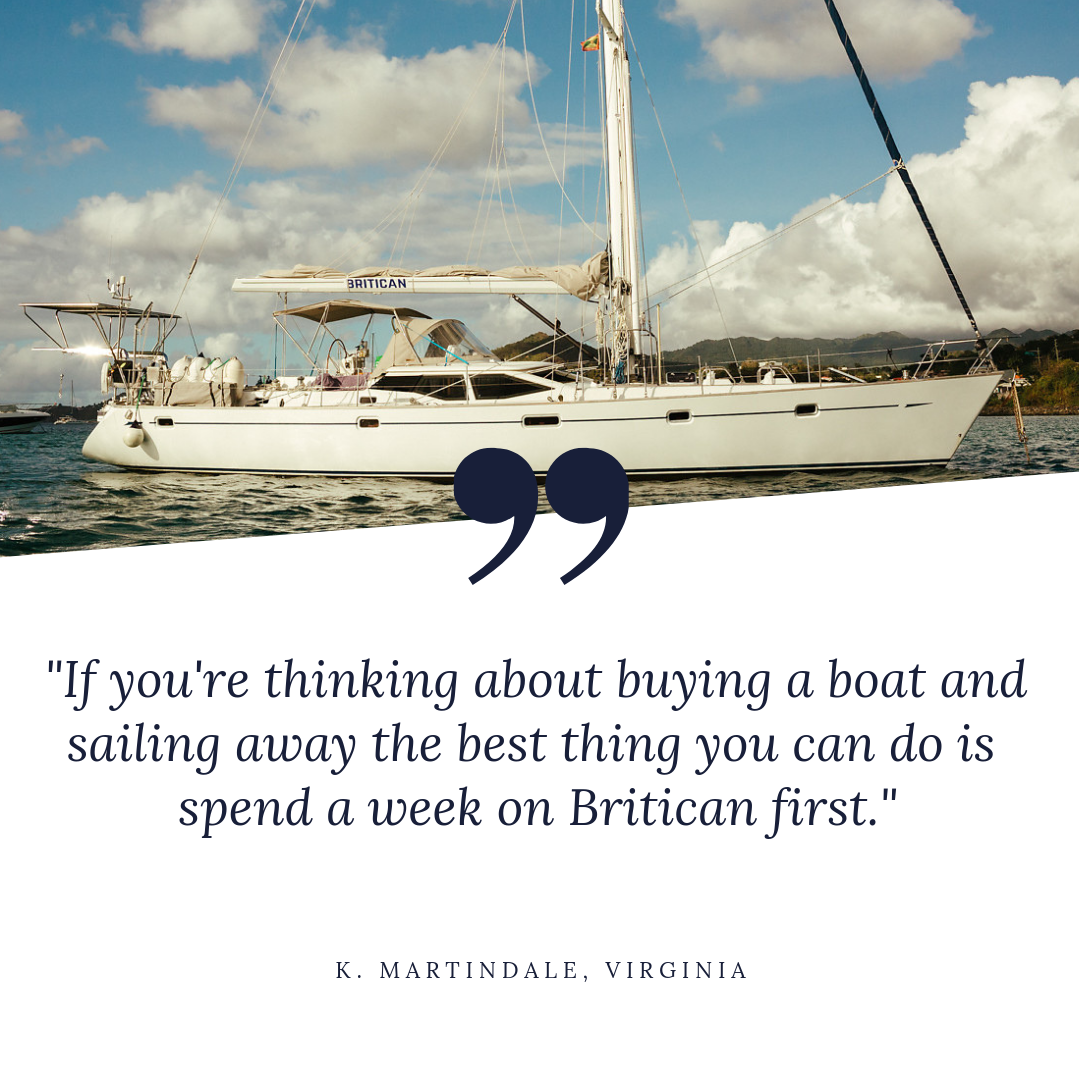 | Try-before-you-buy the liveaboard lifestyle. Spend one week with us to give the life a test drive. Learn about sailing, anchoring, maneuvering in marina's, docking, provisioning, cooking, maintaining, troubleshooting AND checking out all the white sandy beaches, snorkeling over the fish-filled reef and testing out exotic tropical drinks. You create the itinerary - if you want to try sailing at night, we'll sail at night. If you want to gain confidence on passage planning, we'll plan passages. Click here for more information. |
13. Do figure out the best way to afford the lifestyle
There are many blue water cruisers that wing it. They have a bit of money and try to make an income while living on a boat.
Many people sail for a while, return to land to make more money, and sail again.
Some people sail for six months and work for the other six. There are loads of options but not having something that’s going to work can cause quite a bit of stress.
Finding work in foreign countries is not easy and it’s frowned upon if you’re seen to be getting paid and the locals are not. This area of concern is not necessarily something to put on the ‘we’ll figure it out later list.’
Learning to sail, maintain a boat and acclimating to the bluewater lifestyle is quite a big bite to chew.
If you can sort out a way to ensure a monthly cash flow it will make the journey far easier.
14. You Tell Me
What’s missing? How else do newbies need to avoid failure when becoming bluewater cruiser? Please leave your thoughts and comments below.
Other Articles/Videos You Might Be Interested In
- Questions Answered About The Liveaboard Life
- Living On A Sailboat Q&A
- Top 10 Must-Haves: The Best Cruising Boat For The Caribbean
- Blue Water Sailing Checklist
CREDITS: Currently on board with us is Chiara Magi, the lovely person taking the pictures you’ve enjoyed today. Chiara is an amazing person. She’s smart, beautiful, talented and eager to experience the world. She was born in Estonia but currently lives in Italy. Chiara is a videographer so check her out on YouTube/Chiara – I wonder if Chiara will be bitten by the liveaboard life bug and consider a future life on the sea?
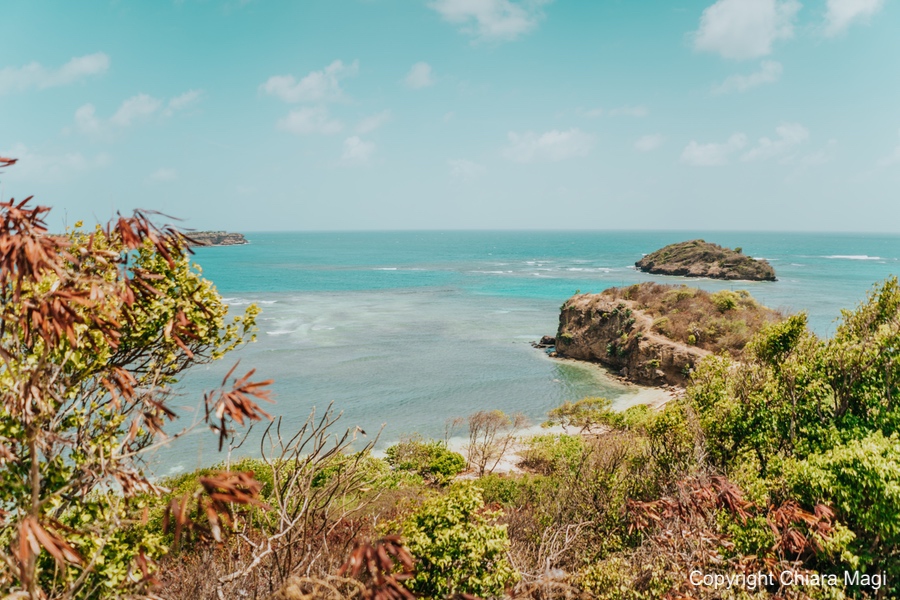
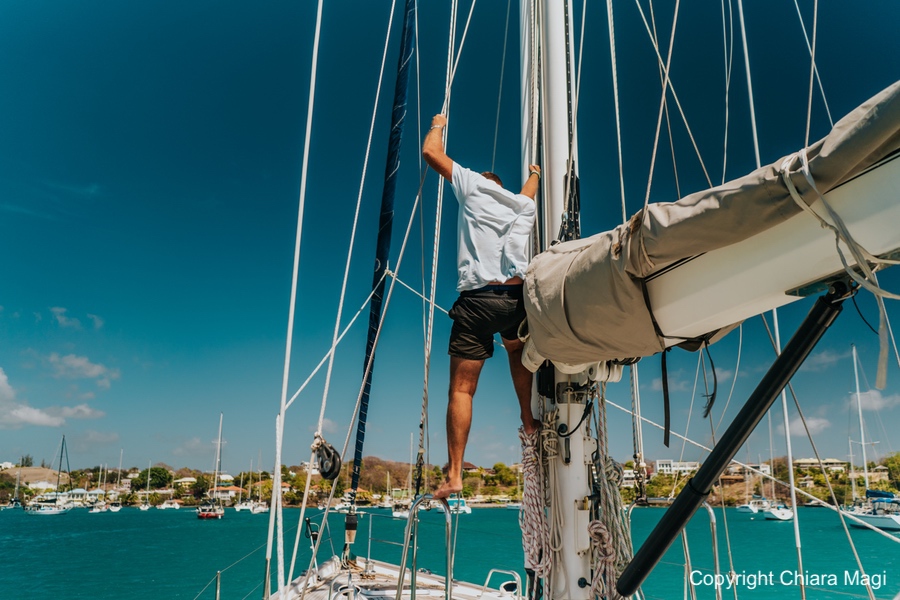
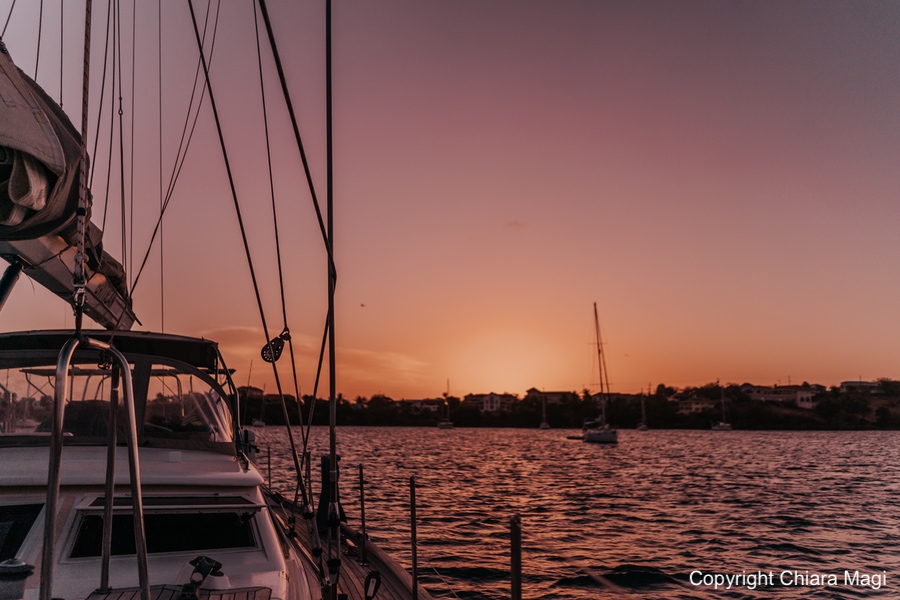
Awesome article and very informative!! Thank you for taking the time to put out all the content that you do. Have enjoyed following ya’lls journey and adventures. And as always, I’m very appreciative of all the life lessons and information I can absorb from your articles. Hope you have fair wind and sunny skies.
Thank you David 🙂 Kim
I have to agree this was quite lovely to read, I see quite a few solid points and I will surely share this with my girlfriend. We are going on are 3rd sailboat and finally are going to soon start a Vlog up to share the buying surveying and ownership experience, I love reading people’s write up’s ! 🙂
Thanks again!
Are YouTube is- Salty Fry
We haven’t started yet but I will share you’re blog,
in one of are video’s for sure.
Take care! & FAIR WINDS 🙂
Any recommendation for a future solo cruiser? I am getting ready to move on, not sure if you have a post about it. But could be interesting know about your experiences about full solo living cruiser.
There are several bloggers and book writers out there that offer suggestions and reflections on solo sailing. We’ve been a family the whole time so can’t comment. Smiles, Kim
Great advice Kim, I have one thought to add. To avoid becoming overwhelmed have an outline for your big plan in mind, but focus’s on just the next bit, small steps put together can take you a long way.
Rozx
Great advice Rick and Roz 🙂 Thank you! Kim
Wonderful article. well written and informative. Thanks.
I am transitioning from seasonal live aboard in Maine to full time live aboard. I am a single-hander and older and maintaining my stamina for the trip South in the fall is a concern.
Have you considered taking on a volunteer crew member to help you out? Thank you for your comments Laura 🙂 Kim
Kim, one of your best posts. Really great advice. Thanks!
Thank you Richard 🙂 Kim
All spot on, and thanks for the information, which is a reminder to me, as I sailed solo for 5 years in Mexico. Solo was the hardest part, but I’ve adjusted my thinking, and am considering doing it all again. The sound of the water over the hull and the sight of a distant headland I’m going to round under sail are just so beautiful. The work, work, work is pretty interesting too, if approached with a “let’s have fun with this” attitude. 😀
See you on the sea soon Eldon 🙂
Wow, that article is awesome! I couldn’t say it better. I just got back from living on a catamaran for 5 months to the Bahamas and I experienced everything in the article!
So whomever is reading this and saying this won’t happen to me….. don’t believe it, it will happen! I kept feeling bored with the “beautiful” weather and unappreciative of it… it was my new normal. I really couldn’t get used to not showering and not going for a walk whenever I wanted. I wanted “action” and now that I’m back in the USA I’m wishing I was back in the Bahamas! LOL!
Thank you so much for your comments, Diane. It’s so funny when I hear my boat buddies complain about boat life…They then go back to land and complain even more than they ever complained in the first place. Hahahahah. Big smiles, Kim
Excellent overview for those thinking about taking the plunge. Lots of information to take in and think about mixed with the anticipation of starting a new adventure in living. You can’t achieve your goal if you don’t take that first step.
Thanks for the comments Bob 🙂 Big smiles, Kim
Thank you for the article. I just bought a 26’ Balboa to sail on Klamath Lake, Oregon this summer then to the pacific for a couple of summers. In 2.5 years I plan to sell the home and buy a nice liveaboard but come to the Gulf or Florida’s Atlantic side for living life! Not existing. My ONLY enemy is age. Just turned 66 so SS will be my income. I figure 15-20 more good years. All your articles actually are an inspiration. I sailed and worked on boats but it’s been 42 years so I hope its like riding a bicycle.
Irvin
It’s totally like riding a bicycle Irvin – just make sure you get a boat that you can handle easily. When we get older things are not as easy as they were when we were younger – but that doesn’t mean they’re not do-able. It’s just a matter of finding the right boat and then getting back out to sea. We look forward to meeting you in an anchorage soon 🙂 Big smiles, Kim
Great post and it covers a lots of areas people might not have thought of. Our experience of liveaboard boating, even on sheltered Great Lakes, is that fear becomes a factor that affects everyday life and magnifies all the other stresses of being in an enclosed space together 24/7. Some husbands become ‘Captain Bligh’ in their terror that someone will fall overboard and be minced under the propellers. And oh, the expenses – of dockage, parts, servicing, fuel… it never ends! After 3 seasons we’re slowly honing our skills, finding balance and more times of enjoyment but I suspect in a few years’ time we may swap the boat for an RV just to escape one layer of stress! You may discover that while your partner is perfect for you in one lifestyle, they may not be the right partner for boating – so definitely test the scenario first before committing!
Great feedback Bev! Thank you so much for contributing 😉 Big smiles, Kim
A very helpful article for someone like me who is soon to transition from canal to sea.
Only difference is, while I have a small but regular income, I have no house to sell and will
have to be frugal. I will have about £30000 to spend on a boat. I am hoping to buy a hustler
or similar old, heavy, long keeled boat that I can fix if it needs fixing. I have been in engineering for
all my working life and hope to maintain the boat myself.
Am I dreaming too much…?
Hey Pete – I don’t think you’re dreaming too much! People make things work all the time. And there are often very good boats going for low prices if you look around. Hopefully, we’ll see you on the sea soon 🙂 Smiles, Kim
Well hello,I have been following you and your lovely Family for a few Years now and I have seen most of the Ups and downs of your sailing life .What I adore most is your honesty of your web post ,and your community,in this part of the Caribbean,However,you have made your debut in the Mediterranean.This to me sounds More exotic then the the America ,because this is Further away perhaps ???However.I am sure this as been a little part of your life’s journey so far ?I can see the Mediterranean is or should I say More unsafe.these days ?Have you sailed the Pacific Ocean to the opposite side of the world ?I followed a French Doc with his what seams as a Solo ,(But I’am sure he had a a full Team helping him at All points HA!HA!/
Keep up your Great Work and Play .Good Luck and God Bless .
A true admired er,of the Blue Water life .Guy Dutrisac Alberta Canada
Thank you for your kind comments Guy. I don’t think the Caribbean or Med are unsafe…you just have to keep and eye on where issues might be cropping up and avoid certain areas. I suppose that’s the same for the whole world – eh? We haven’t been to the Pacific yet but it’s on the cards. One day! Thank you for writing 🙂 Kim
Excellent advice and observations. We’re going into our ninth year living aboard five months per year, and now transitioning to ten months. We’ll be seeing you in a few months down on the windward islands. Ken “Orinoco”
Yes great article. I’ve found boat life tends to “accentuate” personalities. Whilst we can all get on with each other for a short amount of time living very close together on a boat for an extended period may highlight some personality traits that over time can be very annoying. Crew being asked to leave a boat, or crew leaving unexpectedly early and factions developing between crew are all things I’ve experienced first hand in just 6,000nm. One skipper I sailed with as crew needed no less than a personal recommendation from someone he had already sailed with extensively before he’d take me on. He is a decent chap with 100,000nm experience……
Kim.
My hub and I are getting close to jumping in to this way of life. Our dream is to circumnavigate.
We are equally invested. We have sailed recreationally in the past.
Five years ago we sold everything and moved into an RV, living in a campground for 2 years.
That was a great test of both our adaptability and relationship.
We designed and built a tiny house a year ago. Now we wish we hadn’t.
New plan: Retiring early in 3 years.
I know nothing about HOW to choose an appropriate boat.
I’m also intrigued with your sail-along trips.
Advice?
Thanks.
Hey Michelle,
It sounds like you and hub are travelers 🙂 I can’t imagine ever getting a house. When we get tired of an area we just sail to another. And the great thing about a boat is that we can go anywhere! I have a couple of articles about buying a boat for cruising. Check out my boat buying articles here: https://sailingbritican.com/category/buying-a-boat/ And regarding our Britican Experiences…I’ve just added a new section to our website about case studies of our past guests. Check those out here: https://sailingbritican.com/gaining-sailing-experience/ Most of our guests go on to buy a boat or are in the process of buying one so the experience is really helpful to get things moving 🙂 Thanks so much for your comments. Big smiles, Kim
Great advice, but you missed one thing. Have a goal. Years ago my parents stuck a pin in a map and said ” let’s go there”. We did. It was a bay in the island of Corsica…and it was the greatest adventure of my childhood. So my advice is not to be aimless, but have a geographic goal…and make it happen. It will focus your resolve, and get you through the difficult times. Now I’m 65…and were doing just that.
Great advice Nicholas. Thank you for commenting. Smiles, Kim
Great article. I especially liked your analogy of expecting a baby. That helped me but our upcoming boating lifestyle into perspective. Thank you!
A great article,enjoyed it very much.
You said “no one uses charts and dividers anymore”
Yes we do !
If systems go down (and they do).How do you know where you are,or what course to plot.
Always have a manual backup